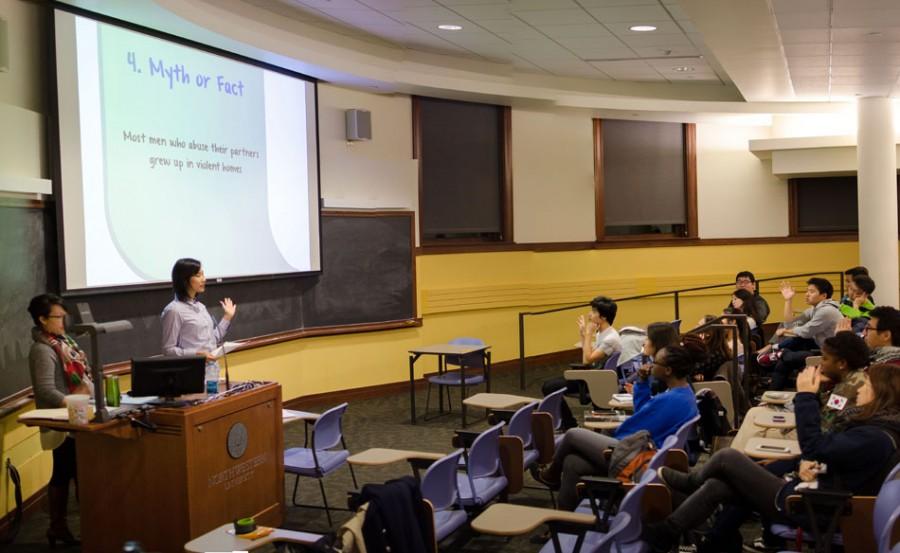Korea Peace Day discusses domestic violence, sexual assault
Matthew Zhang/The Daily Northwestern
A KAN-WIN representative presents “myth or fact” questions about domestic violence at Korea Peace Day. The event brought speakers to discuss issues facing the Korean community.
October 24, 2014
The Asian Pacific American Coalition and Korean American Students Association celebrated Korea Peace Day on Thursday night, an annual event during which the two student groups collaborate and listen to a speaker discuss an issue facing the Korean community.
Two representatives from KAN-WIN, a Chicago-based organization that helps Asian-American women deal with domestic violence and sexual assault, spoke to students about immigrants’ experiences with domestic violence and how to recognize the signs on a college campus.
“In years past, we talked a lot about the North and South Korea conflict,” said Weinberg sophomore Younglak Hong, philanthropy chair of KASA. “This year we wanted to change it up a bit and try women’s rights. We thought it was a topic worth exploring because it’s relevant to students.”
KAN-WIN’s presentation aimed at distinguishing facts from myths about domestic violence. The speakers spoke about four types of abuse: physical, emotional, financial and sexual. They also discussed barriers including religion, language, immigration status and culture that many Asian-American immigrants face in coping with these types of abuse.
KAN-WIN presenters discussed their survey involving 359 Chicago area Asian-American respondents, which found that 34 percent grew up witnessing domestic violence in their homes.
“Domestic violence is used by one person in an intimate relationship in order to establish and maintain power and control over the other person,” said Ji Hye Kim, associate director of KAN-WIN. “Abuse can show up in any kind of mannerism.”
The speech engaged attendees with activities testing their knowledge of domestic violence. The speakers then identified signs of abuse and ways to react to these warning signs, specifically on a college campus.
Anna Bang, KAN-WIN’s multicultural advocacy coordinator, said domestic violence can occur anywhere, and as college students, knowing this could help other students.
Kim and Bang described the cycle of domestic abuse, which is a continuous shift between a “tension, explosion and honeymoon period.”
“When you boil hot water and put a frog in hot water, it will jump out,” Bang said. “But if you put a frog in really cool and pleasant temperature and start boiling the water, it’s too late for it to jump out. This is a metaphor for how domestic violence occurs in a relationship.”
About 30 people attended the event, including Weinberg freshman Abraham Kim.
“Before, I knew about domestic violence, but it shed a light on immigration’s effect on domestic violence,” he said.
KAN-WIN provides several services for Asian Americans affected by domestic violence, including a 24-hour hotline, transitional housing, support groups, legal advocacy and a children’s program.
KAN-WIN is also recruiting student peer advocates to spread awareness of domestic violence as part of their education and outreach efforts.
Email: [email protected]
Twitter: @amandasvachula


